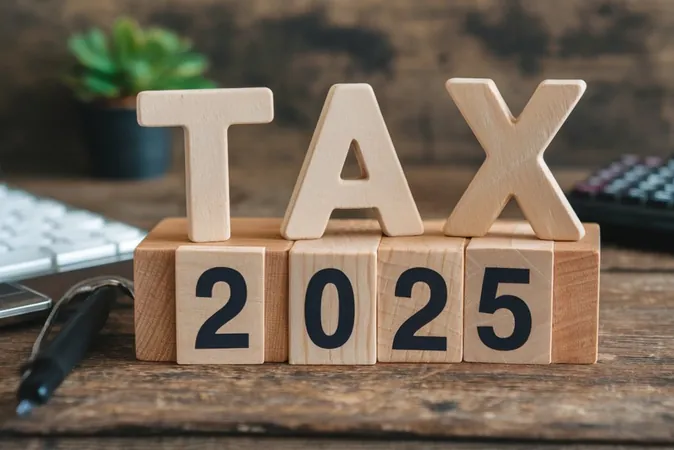
Brace Yourself: Crucial Tax Changes Coming to Canada in 2025!
2025-01-11
Author: Jacques
Significant Capital Gains Tax Revisions
In a move aimed at revising Canada’s tax framework, the federal government is planning substantial adjustments to the capital gains tax for the upcoming tax season. While these changes are not yet officially legislated, the Canada Revenue Agency (CRA) has indicated that proposals will take effect based on a federal notice of motion by June 25, 2024.
What You Need to Know: The inclusion rate for taxable capital gains will increase from 50% to an eye-watering 67% for individuals whose gains exceed $250,000 annually. However, if you find yourself making less than $250,000 in capital gains, you can continue benefiting from the existing 50% rate. Principal residences still maintain their exemption from capital gains tax, a significant relief for homeowners. Corporations and various trusts won't escape the changes either, as they will also face the new inclusion rate.
Online Tax Filing Updates
As Canadians prepare for the 2025 tax season, which kicks off mid-February, there are several updates to keep in mind: The CRA will introduce a revamped T619 electronic transmittal record. Ensure to include this updated form! Each tax return type must now be filed separately—no more combining multiple returns into one. Online validation processes will now allow real-time error flags, minimizing filing mistakes.
Expanding Automatic Tax Filing Services
In a bid to streamline tax processes, the federal government aims to broaden its automatic tax filing initiative, SimpleFile by Phone, which will invite an additional 500,000 Canadians in 2025, bumping the total to two million eligible participants.
Contribution Limits Set to Change
For Canadian savers, new contribution limits will bring both opportunities and challenges in 2025: The Registered Retirement Savings Plan (RRSP) limit will see a rise to $32,490, allowing more leeway for tax-deferred retirement savings. For the Canada Pension Plan (CPP), the Year’s Maximum Pensionable Earnings (YMPE) will climb to $71,300, while the basic exemption remains steady at $3,500. Self-employed individuals will see their maximum contribution rise to $8,068.20 from $7,735.00. Meanwhile, the Tax-Free Savings Account (TFSA) contribution limit will hold steady at $7,000.
Adjustments Fueled by Inflation
Inflation continues to affect government benefits, ensuring they keep pace with the rising cost of living: OAS payments will remain unchanged in early 2025 due to a stable Consumer Price Index. The Canada Child Benefit (CCB) is projected to increase to $7,997 per year for children under six. The GST/HST credit will also see an increase, providing relief for low- to modest-income families with payments rising to $533 for singles and $698 for couples.
Implications of Vehicle Deduction Limits
Kicking off January 1, 2025, there will also be updates to vehicle income tax deductions: Tax-deductible leasing costs for vehicles will increase to $1,100 monthly. The maximum tax deduction under Capital Cost Allowance for certain vehicles will rise to $38,000. Mileage tax-exempt allowances for personal vehicles used for business will also see an uptick.
Getting Prepared for Financial Changes
With these tax changes looming, it's crucial for Canadians to review their financial strategies. The uplift in RRSP and CPP limits presents a golden opportunity to fortify retirement savings. Meanwhile, proactive measures, such as consulting tax professionals and utilizing CRA resources, will help ensure compliance and maximize financial benefits when filing taxes in 2025. As we face the evolving economic landscape, understanding these updates will be fundamental in navigating the complexities of personal finance. Get ready, as 2025 promises to be a transformative year for Canadian taxpayers!









 Brasil (PT)
Brasil (PT)
 Canada (EN)
Canada (EN)
 Chile (ES)
Chile (ES)
 Česko (CS)
Česko (CS)
 대한민국 (KO)
대한민국 (KO)
 España (ES)
España (ES)
 France (FR)
France (FR)
 Hong Kong (EN)
Hong Kong (EN)
 Italia (IT)
Italia (IT)
 日本 (JA)
日本 (JA)
 Magyarország (HU)
Magyarország (HU)
 Norge (NO)
Norge (NO)
 Polska (PL)
Polska (PL)
 Schweiz (DE)
Schweiz (DE)
 Singapore (EN)
Singapore (EN)
 Sverige (SV)
Sverige (SV)
 Suomi (FI)
Suomi (FI)
 Türkiye (TR)
Türkiye (TR)